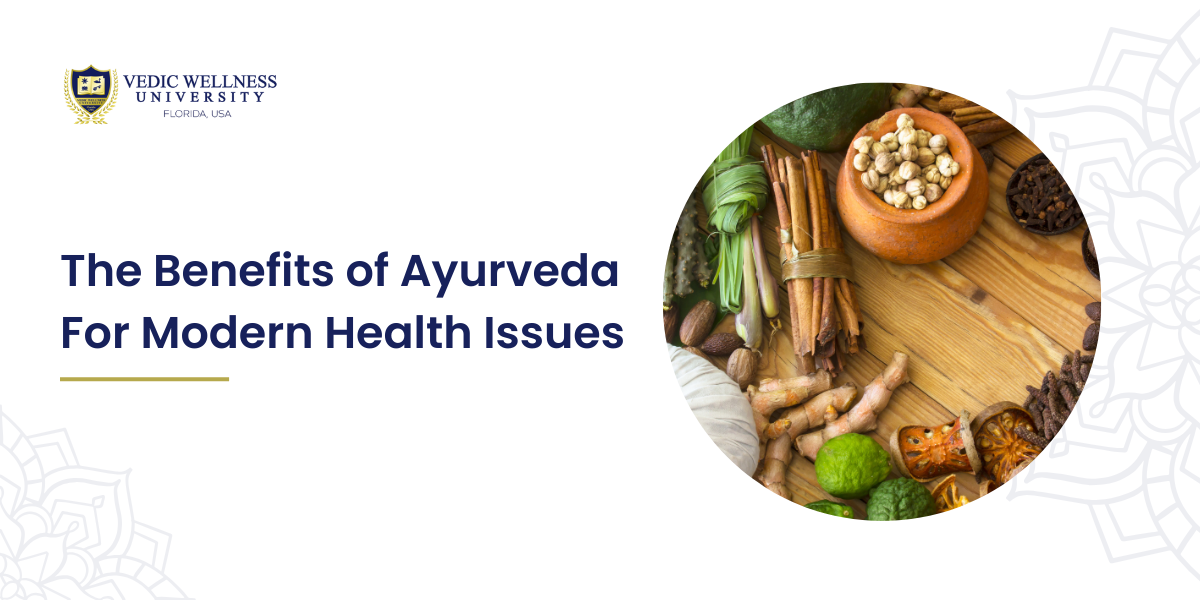Ayurveda, an ancient system of medicine that originated in India over 5,000 years ago, has gained global recognition for its holistic approach to health and wellness. This traditional practice, rooted in the principles of balance and harmony, offers effective solutions to a myriad of modern health issues. As an international institution dedicated to promoting Vedic studies, Vedic Wellness University emphasizes the relevance of Ayurveda in contemporary healthcare. Our extensive Ayurveda and Yoga programs aim to bridge the gap between ancient wisdom and modern medical practices.
Understanding Ayurveda
Ayurveda, “the science of life” in Sanskrit, focuses on maintaining health through balance in the body, mind, and spirit. It categorizes individuals into three primary doshas: Vata, Pitta, and Kapha, each representing different elements and bodily functions. The imbalance of these doshas is believed to cause various health issues. Ayurvedic treatments, therefore, aim to restore this balance through diet, lifestyle changes, herbal remedies, and yoga.

Addressing Modern Health Issues
1. Stress and Anxiety
In today’s fast-paced world, stress and anxiety have become prevalent. Ayurveda offers a comprehensive approach to managing these conditions through practices such as meditation, breathing exercises, and the use of adaptogenic herbs like Ashwagandha and Brahmi. According to a study published in the Journal of Alternative and Complementary Medicine, Ayurvedic treatments significantly reduce stress and improve mental health.
“Sama Dosha Sama Agnischa Sama Dhatu Mala Kriya Prasannatmendriya Manaha Swastha Iti Abhidheeyate”
(A healthy person is one who is established in Self, who has balanced doshas, balanced agni, properly formed dhatus, proper elimination of malas, well-functioning bodily processes, and whose mind, soul, and senses are full of bliss.)
– Sushruta Samhita
2. Chronic Diseases
Ayurveda is effective in managing chronic diseases such as diabetes, hypertension, and arthritis. By focusing on the root cause rather than just the symptoms, Ayurvedic treatments offer long-term relief. For instance, dietary changes and herbal formulations can help manage blood sugar levels and improve insulin sensitivity in diabetic patients.
3. Digestive Disorders
Modern diets and lifestyles often lead to digestive problems like acid reflux, irritable bowel syndrome (IBS), and constipation. Ayurveda emphasizes the importance of Agni (digestive fire) in maintaining health. Practices such as mindful eating, incorporating digestive spices like ginger and cumin, and regular detoxification can significantly improve digestive health.
“Aharavidhi Visheshayatana Adhyaya”
(Diet and lifestyle recommendations to maintain balance and harmony.)
– Charaka Samhita

Ayurveda and Yoga: A Powerful Combination
Integrating Ayurveda and Yoga, often called “Ayurveda Yoga,” is a powerful approach to achieving holistic health. Yoga practices enhance the benefits of Ayurvedic treatments by promoting physical, mental, and spiritual well-being. This combination addresses the body and mind simultaneously, effectively treating various health conditions.
4. Weight Management
Obesity is a major health issue globally. Ayurveda Yoga provides a sustainable approach to weight management by focusing on a balanced diet, regular physical activity, and detoxification practices. Ayurvedic herbs such as Triphala and Guggul aid in fat metabolism and improve overall health.
5. Skin and Hair Health
Ayurvedic remedies are renowned for their effectiveness in treating skin and hair problems. The use of natural ingredients like turmeric, neem, and aloe vera helps in managing conditions like acne, eczema, and hair fall. Ayurvedic massages and oil treatments also promote healthy skin and hair.
Scientific Backing
The efficacy of Ayurveda is increasingly being supported by scientific research. Studies have shown that Ayurvedic treatments can lead to significant improvements in various health conditions. For instance, a research article in the Journal of Ayurveda and Integrative Medicine highlights the benefits of Ayurvedic interventions in managing rheumatoid arthritis.
Global Recognition
The global acceptance of Ayurveda is growing, with countries like the USA, Canada, and Australia incorporating Ayurvedic practices into their healthcare systems. International students and practitioners are turning to institutions like Vedic Wellness University to gain a deeper understanding of Ayurveda and its applications.
“Sarve Bhavantu Sukhinah, Sarve Santu Niramayah”
(May all be happy, may all be free from diseases.)
– Brihadaranyaka Upanishad

Conclusion
Ayurveda offers a holistic approach to health that addresses the root causes of modern health issues. By integrating Ayurvedic principles with contemporary medical practices, we can achieve optimal health and well-being. As we continue to explore and embrace this ancient wisdom, it is essential to educate and promote its benefits on a global scale. Vedic Wellness University is committed to this mission, providing comprehensive education and research opportunities in Ayurveda and related fields.
For those seeking a natural and holistic way to manage their health, Ayurveda provides a time-tested and scientifically supported approach that can significantly improve quality of life. Join us at Vedic Wellness University to discover the profound benefits of Ayurveda and Yoga for modern health challenges.


